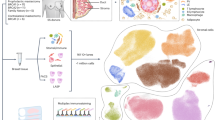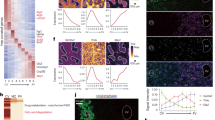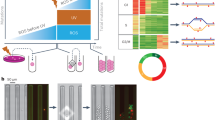Abstract
NORMAL tissue antigens have frequently been shown to be absent from experimentally induced tumours. Thus immunohistological studies have shown the loss of kidney antigens in, stilboestrol and X-ray induced kidney tumours1,2, of skin antigens in 3-methylcholanthrene-induced mouse squamous cell carcinomata3 and certain muscle antigens in 3-methylcholanthrene-induced rat rhabdomyosarcomata4. By far the most extensively studied class of tumours are the chemically induced hepatomata where deletion of liver antigens has been shown in tumours induced with 4-dimethylaminoazobenzene5–7, diethylnitrosamine8 and 2-acetamidofluorene9 in the rat and o-aminoazotoluene in the mouse10. Previous studies5 denned the number and subcellular distribution of normal rat liver antigens deleted from primary hepatomata induced with 4-dimethylaminoazobenzene. These studies have been extended to compare the pattern of antigen deletions in rat hepatomata induced with 2-acetamidofluorene and diethylnitrosamine using both primary and transplanted tumours.
This is a preview of subscription content, access via your institution
Access options
Subscribe to this journal
Receive 51 print issues and online access
$199.00 per year
only $3.90 per issue
Buy this article
- Purchase on Springer Link
- Instant access to full article PDF
Prices may be subject to local taxes which are calculated during checkout
Similar content being viewed by others
References
Nairn, R. C., Richmond, H. G., McEntegart, M. G., and Fothergill, J. E., Brit. Med. J., ii, 1335 (1960).
Deckers, C., Structure Antigénique de Tumeurs Expérimentales (Éditions Arscia S.A., Brussels, 1964).
Carruthers, C., and Baumler, A., J. Nat. Cancer Inst., 34, 191 (1965).
Fel, V. J., and Tsikarishvili, T. N., Cancer Res., 24, 1675 (1964).
Baldwin, R. W., Brit. J. Cancer, 18, 285 (1964).
Deckers, C., and Maisin, J., Rev. Belg. Path. Med. Exp., 28, 477 (1962).
Kalnins, V. I., and Stich, H. F., Nature, 200, 189 (1963).
Fel, V. J., Tsikarishvili, T. N., and Shvemberger, I. N., Vopr. Onkol., 10, 66 (1964).
Hiramoto, R., Bernecky, J., Jurandowski, J., and Pressman, D., Cancer. Res., 21, 1372 (1961).
Abelev, G. I., Khramkova, N. I., and Postnikova, Z. A., Neoplasma, 9, 123 (1962).
Lowry, O. H., Rosebrough, N. J., Farr, A. L., and Randall, R. J., J. Biol. Chem., 193, 265 (1951).
Woodruff, M. F. A., and Symes, M. O., Brit. J. Cancer, 16, 484 (1962).
Freed, J. J., and Sorof, S., Biochem. Biophys. Res. Commun., 22, 1 (1966).
Sachs, L., Nature, 207, 1272 (1965).
Kitagawa, M., Yagi, Y., Planinsek, J., and Pressman, D., Cancer Res., 26, 221 (1966).
Author information
Authors and Affiliations
Rights and permissions
About this article
Cite this article
BALDWIN, R., BARKER, C. Antigen Deletions in Carcinogen-induced Rat Hepatomata. Nature 214, 292–293 (1967). https://doi.org/10.1038/214292a0
Issue Date:
DOI: https://doi.org/10.1038/214292a0
Comments
By submitting a comment you agree to abide by our Terms and Community Guidelines. If you find something abusive or that does not comply with our terms or guidelines please flag it as inappropriate.



